MSc HwTM: Cross-Cultural Encounters and Business Analysis
VerifiedAdded on 2023/01/11
|14
|4701
|68
Presentation
AI Summary
This presentation analyzes the complexities of cross-cultural encounters for national, international, and multinational businesses, focusing on the application of the Country Navigator WorldPrism tool. The first part of the presentation provides a theoretical analysis of the tool, its relevance to the course's concepts, and supporting citations. The second part applies the tool to a case study of Bentley Motors, comparing the cultures of the United Kingdom and Spain, examining the impact of cultural differences on management activities like time perception, time orientation, power dynamics, and competitiveness. The presentation further explores the impact of cultural differences within multi-cultural teams and suggests methods for promoting positive and ethical cross-cultural behaviors, including staff training and multi-cultural team working. The presentation is organized into two main parts: theory and practice, and it provides a detailed overview of the cultural nuances that influence business operations.
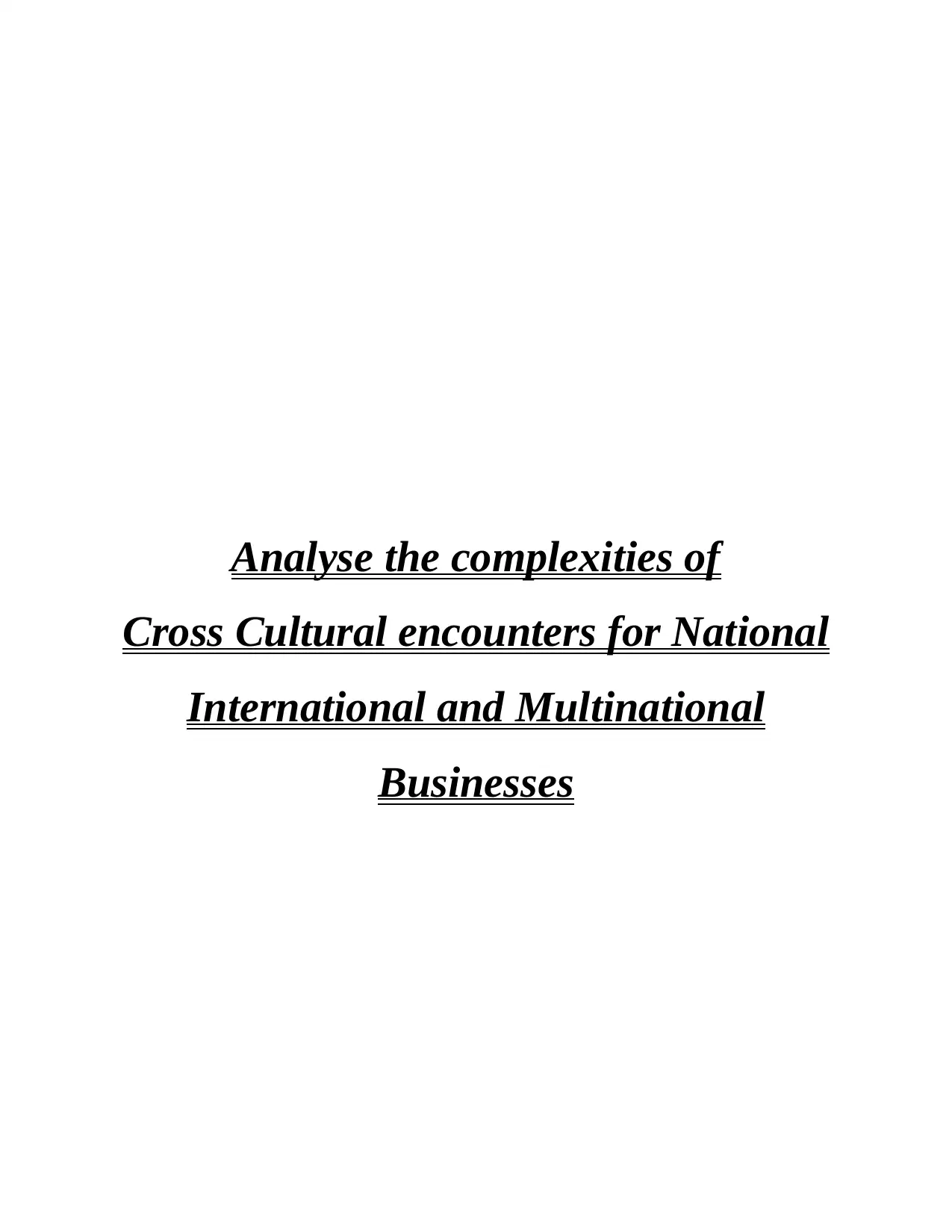
Analyse the complexities of
Cross Cultural encounters for National
International and Multinational
Businesses
Cross Cultural encounters for National
International and Multinational
Businesses
Paraphrase This Document
Need a fresh take? Get an instant paraphrase of this document with our AI Paraphraser
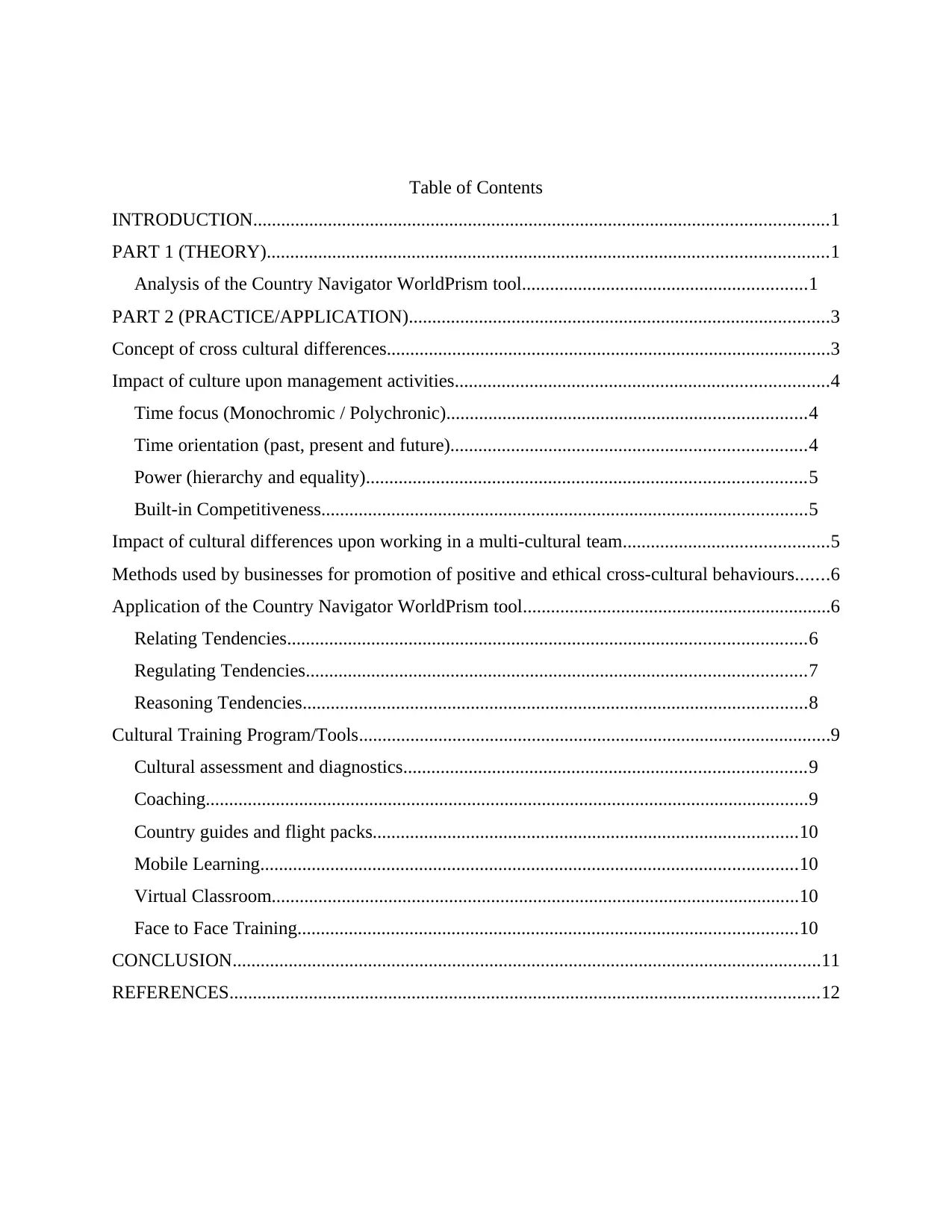
Table of Contents
INTRODUCTION...........................................................................................................................1
PART 1 (THEORY)........................................................................................................................1
Analysis of the Country Navigator WorldPrism tool.............................................................1
PART 2 (PRACTICE/APPLICATION)..........................................................................................3
Concept of cross cultural differences...............................................................................................3
Impact of culture upon management activities................................................................................4
Time focus (Monochromic / Polychronic).............................................................................4
Time orientation (past, present and future)............................................................................4
Power (hierarchy and equality)..............................................................................................5
Built-in Competitiveness........................................................................................................5
Impact of cultural differences upon working in a multi-cultural team............................................5
Methods used by businesses for promotion of positive and ethical cross-cultural behaviours.......6
Application of the Country Navigator WorldPrism tool..................................................................6
Relating Tendencies...............................................................................................................6
Regulating Tendencies...........................................................................................................7
Reasoning Tendencies............................................................................................................8
Cultural Training Program/Tools.....................................................................................................9
Cultural assessment and diagnostics......................................................................................9
Coaching.................................................................................................................................9
Country guides and flight packs...........................................................................................10
Mobile Learning...................................................................................................................10
Virtual Classroom.................................................................................................................10
Face to Face Training...........................................................................................................10
CONCLUSION..............................................................................................................................11
REFERENCES..............................................................................................................................12
INTRODUCTION...........................................................................................................................1
PART 1 (THEORY)........................................................................................................................1
Analysis of the Country Navigator WorldPrism tool.............................................................1
PART 2 (PRACTICE/APPLICATION)..........................................................................................3
Concept of cross cultural differences...............................................................................................3
Impact of culture upon management activities................................................................................4
Time focus (Monochromic / Polychronic).............................................................................4
Time orientation (past, present and future)............................................................................4
Power (hierarchy and equality)..............................................................................................5
Built-in Competitiveness........................................................................................................5
Impact of cultural differences upon working in a multi-cultural team............................................5
Methods used by businesses for promotion of positive and ethical cross-cultural behaviours.......6
Application of the Country Navigator WorldPrism tool..................................................................6
Relating Tendencies...............................................................................................................6
Regulating Tendencies...........................................................................................................7
Reasoning Tendencies............................................................................................................8
Cultural Training Program/Tools.....................................................................................................9
Cultural assessment and diagnostics......................................................................................9
Coaching.................................................................................................................................9
Country guides and flight packs...........................................................................................10
Mobile Learning...................................................................................................................10
Virtual Classroom.................................................................................................................10
Face to Face Training...........................................................................................................10
CONCLUSION..............................................................................................................................11
REFERENCES..............................................................................................................................12
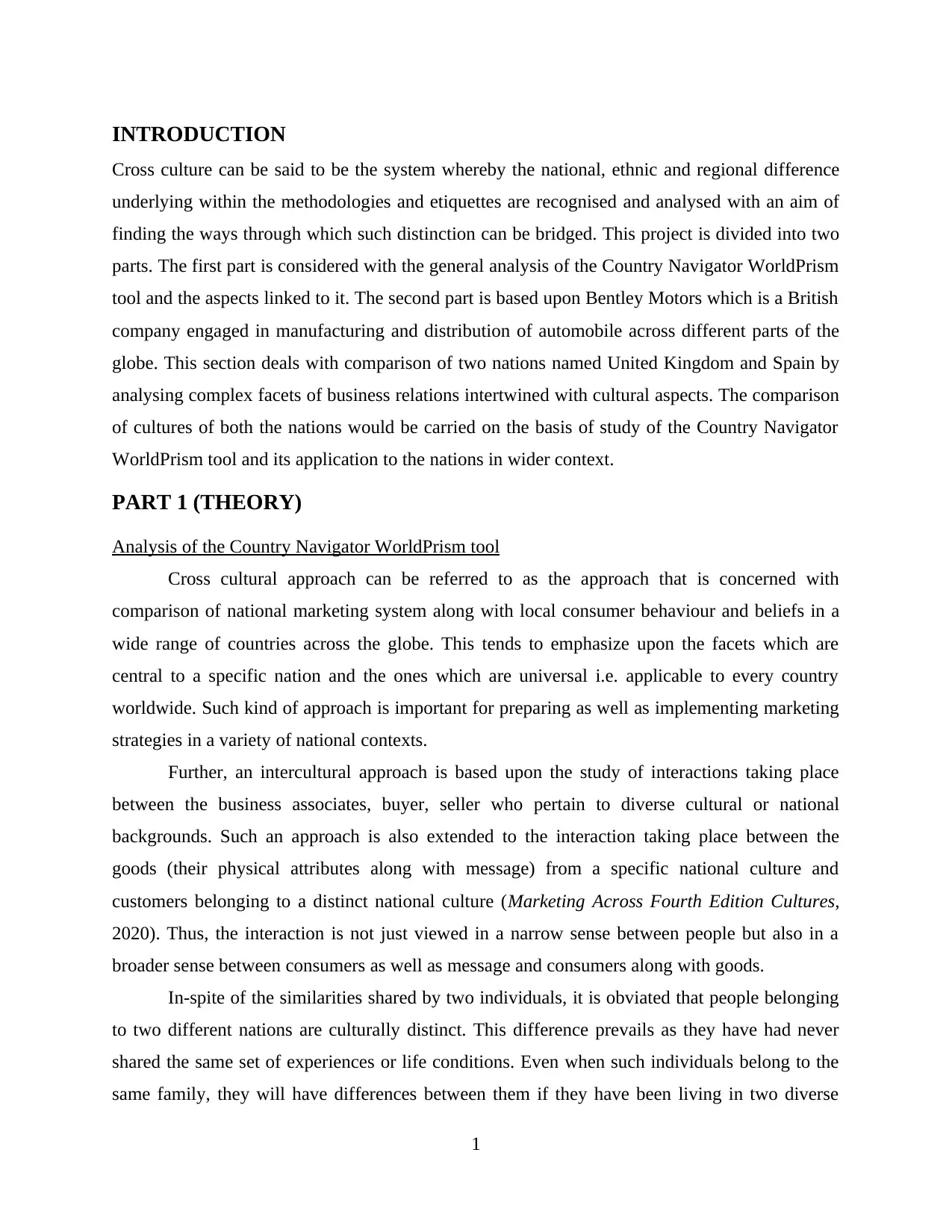
INTRODUCTION
Cross culture can be said to be the system whereby the national, ethnic and regional difference
underlying within the methodologies and etiquettes are recognised and analysed with an aim of
finding the ways through which such distinction can be bridged. This project is divided into two
parts. The first part is considered with the general analysis of the Country Navigator WorldPrism
tool and the aspects linked to it. The second part is based upon Bentley Motors which is a British
company engaged in manufacturing and distribution of automobile across different parts of the
globe. This section deals with comparison of two nations named United Kingdom and Spain by
analysing complex facets of business relations intertwined with cultural aspects. The comparison
of cultures of both the nations would be carried on the basis of study of the Country Navigator
WorldPrism tool and its application to the nations in wider context.
PART 1 (THEORY)
Analysis of the Country Navigator WorldPrism tool
Cross cultural approach can be referred to as the approach that is concerned with
comparison of national marketing system along with local consumer behaviour and beliefs in a
wide range of countries across the globe. This tends to emphasize upon the facets which are
central to a specific nation and the ones which are universal i.e. applicable to every country
worldwide. Such kind of approach is important for preparing as well as implementing marketing
strategies in a variety of national contexts.
Further, an intercultural approach is based upon the study of interactions taking place
between the business associates, buyer, seller who pertain to diverse cultural or national
backgrounds. Such an approach is also extended to the interaction taking place between the
goods (their physical attributes along with message) from a specific national culture and
customers belonging to a distinct national culture (Marketing Across Fourth Edition Cultures,
2020). Thus, the interaction is not just viewed in a narrow sense between people but also in a
broader sense between consumers as well as message and consumers along with goods.
In-spite of the similarities shared by two individuals, it is obviated that people belonging
to two different nations are culturally distinct. This difference prevails as they have had never
shared the same set of experiences or life conditions. Even when such individuals belong to the
same family, they will have differences between them if they have been living in two diverse
1
Cross culture can be said to be the system whereby the national, ethnic and regional difference
underlying within the methodologies and etiquettes are recognised and analysed with an aim of
finding the ways through which such distinction can be bridged. This project is divided into two
parts. The first part is considered with the general analysis of the Country Navigator WorldPrism
tool and the aspects linked to it. The second part is based upon Bentley Motors which is a British
company engaged in manufacturing and distribution of automobile across different parts of the
globe. This section deals with comparison of two nations named United Kingdom and Spain by
analysing complex facets of business relations intertwined with cultural aspects. The comparison
of cultures of both the nations would be carried on the basis of study of the Country Navigator
WorldPrism tool and its application to the nations in wider context.
PART 1 (THEORY)
Analysis of the Country Navigator WorldPrism tool
Cross cultural approach can be referred to as the approach that is concerned with
comparison of national marketing system along with local consumer behaviour and beliefs in a
wide range of countries across the globe. This tends to emphasize upon the facets which are
central to a specific nation and the ones which are universal i.e. applicable to every country
worldwide. Such kind of approach is important for preparing as well as implementing marketing
strategies in a variety of national contexts.
Further, an intercultural approach is based upon the study of interactions taking place
between the business associates, buyer, seller who pertain to diverse cultural or national
backgrounds. Such an approach is also extended to the interaction taking place between the
goods (their physical attributes along with message) from a specific national culture and
customers belonging to a distinct national culture (Marketing Across Fourth Edition Cultures,
2020). Thus, the interaction is not just viewed in a narrow sense between people but also in a
broader sense between consumers as well as message and consumers along with goods.
In-spite of the similarities shared by two individuals, it is obviated that people belonging
to two different nations are culturally distinct. This difference prevails as they have had never
shared the same set of experiences or life conditions. Even when such individuals belong to the
same family, they will have differences between them if they have been living in two diverse
1
⊘ This is a preview!⊘
Do you want full access?
Subscribe today to unlock all pages.

Trusted by 1+ million students worldwide
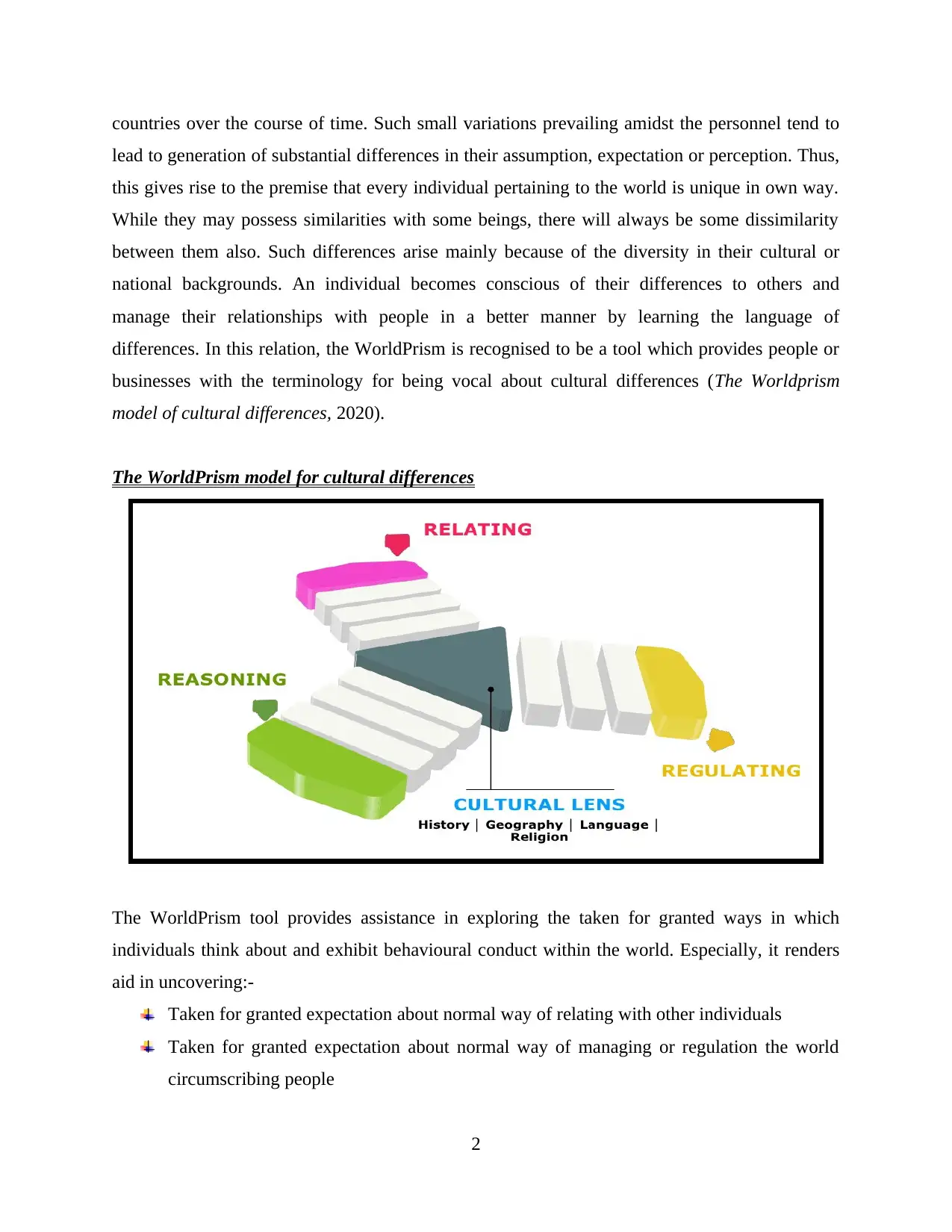
countries over the course of time. Such small variations prevailing amidst the personnel tend to
lead to generation of substantial differences in their assumption, expectation or perception. Thus,
this gives rise to the premise that every individual pertaining to the world is unique in own way.
While they may possess similarities with some beings, there will always be some dissimilarity
between them also. Such differences arise mainly because of the diversity in their cultural or
national backgrounds. An individual becomes conscious of their differences to others and
manage their relationships with people in a better manner by learning the language of
differences. In this relation, the WorldPrism is recognised to be a tool which provides people or
businesses with the terminology for being vocal about cultural differences (The Worldprism
model of cultural differences, 2020).
The WorldPrism model for cultural differences
The WorldPrism tool provides assistance in exploring the taken for granted ways in which
individuals think about and exhibit behavioural conduct within the world. Especially, it renders
aid in uncovering:-
Taken for granted expectation about normal way of relating with other individuals
Taken for granted expectation about normal way of managing or regulation the world
circumscribing people
2
lead to generation of substantial differences in their assumption, expectation or perception. Thus,
this gives rise to the premise that every individual pertaining to the world is unique in own way.
While they may possess similarities with some beings, there will always be some dissimilarity
between them also. Such differences arise mainly because of the diversity in their cultural or
national backgrounds. An individual becomes conscious of their differences to others and
manage their relationships with people in a better manner by learning the language of
differences. In this relation, the WorldPrism is recognised to be a tool which provides people or
businesses with the terminology for being vocal about cultural differences (The Worldprism
model of cultural differences, 2020).
The WorldPrism model for cultural differences
The WorldPrism tool provides assistance in exploring the taken for granted ways in which
individuals think about and exhibit behavioural conduct within the world. Especially, it renders
aid in uncovering:-
Taken for granted expectation about normal way of relating with other individuals
Taken for granted expectation about normal way of managing or regulation the world
circumscribing people
2
Paraphrase This Document
Need a fresh take? Get an instant paraphrase of this document with our AI Paraphraser
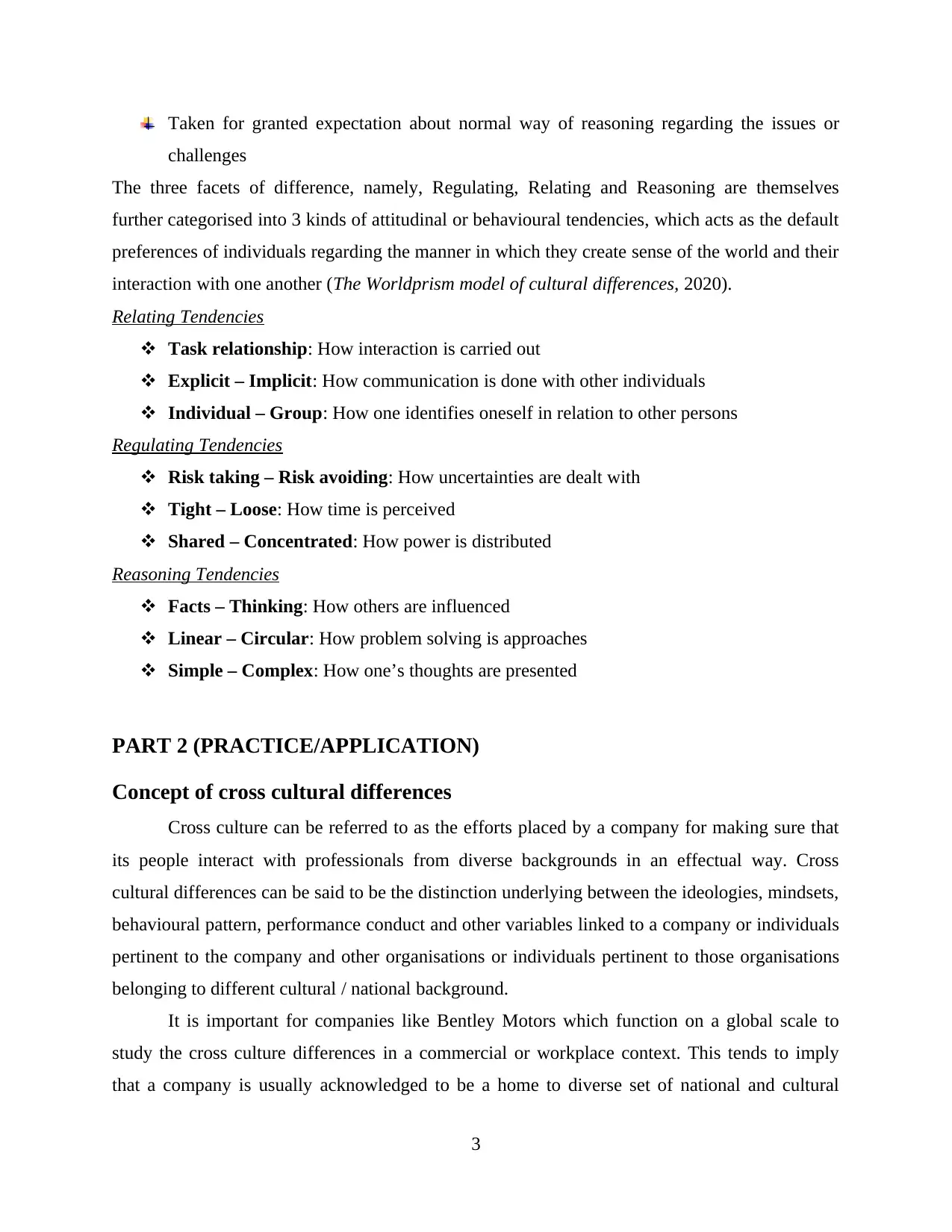
Taken for granted expectation about normal way of reasoning regarding the issues or
challenges
The three facets of difference, namely, Regulating, Relating and Reasoning are themselves
further categorised into 3 kinds of attitudinal or behavioural tendencies, which acts as the default
preferences of individuals regarding the manner in which they create sense of the world and their
interaction with one another (The Worldprism model of cultural differences, 2020).
Relating Tendencies
Task relationship: How interaction is carried out
Explicit – Implicit: How communication is done with other individuals
Individual – Group: How one identifies oneself in relation to other persons
Regulating Tendencies
Risk taking – Risk avoiding: How uncertainties are dealt with
Tight – Loose: How time is perceived
Shared – Concentrated: How power is distributed
Reasoning Tendencies
Facts – Thinking: How others are influenced
Linear – Circular: How problem solving is approaches
Simple – Complex: How one’s thoughts are presented
PART 2 (PRACTICE/APPLICATION)
Concept of cross cultural differences
Cross culture can be referred to as the efforts placed by a company for making sure that
its people interact with professionals from diverse backgrounds in an effectual way. Cross
cultural differences can be said to be the distinction underlying between the ideologies, mindsets,
behavioural pattern, performance conduct and other variables linked to a company or individuals
pertinent to the company and other organisations or individuals pertinent to those organisations
belonging to different cultural / national background.
It is important for companies like Bentley Motors which function on a global scale to
study the cross culture differences in a commercial or workplace context. This tends to imply
that a company is usually acknowledged to be a home to diverse set of national and cultural
3
challenges
The three facets of difference, namely, Regulating, Relating and Reasoning are themselves
further categorised into 3 kinds of attitudinal or behavioural tendencies, which acts as the default
preferences of individuals regarding the manner in which they create sense of the world and their
interaction with one another (The Worldprism model of cultural differences, 2020).
Relating Tendencies
Task relationship: How interaction is carried out
Explicit – Implicit: How communication is done with other individuals
Individual – Group: How one identifies oneself in relation to other persons
Regulating Tendencies
Risk taking – Risk avoiding: How uncertainties are dealt with
Tight – Loose: How time is perceived
Shared – Concentrated: How power is distributed
Reasoning Tendencies
Facts – Thinking: How others are influenced
Linear – Circular: How problem solving is approaches
Simple – Complex: How one’s thoughts are presented
PART 2 (PRACTICE/APPLICATION)
Concept of cross cultural differences
Cross culture can be referred to as the efforts placed by a company for making sure that
its people interact with professionals from diverse backgrounds in an effectual way. Cross
cultural differences can be said to be the distinction underlying between the ideologies, mindsets,
behavioural pattern, performance conduct and other variables linked to a company or individuals
pertinent to the company and other organisations or individuals pertinent to those organisations
belonging to different cultural / national background.
It is important for companies like Bentley Motors which function on a global scale to
study the cross culture differences in a commercial or workplace context. This tends to imply
that a company is usually acknowledged to be a home to diverse set of national and cultural
3
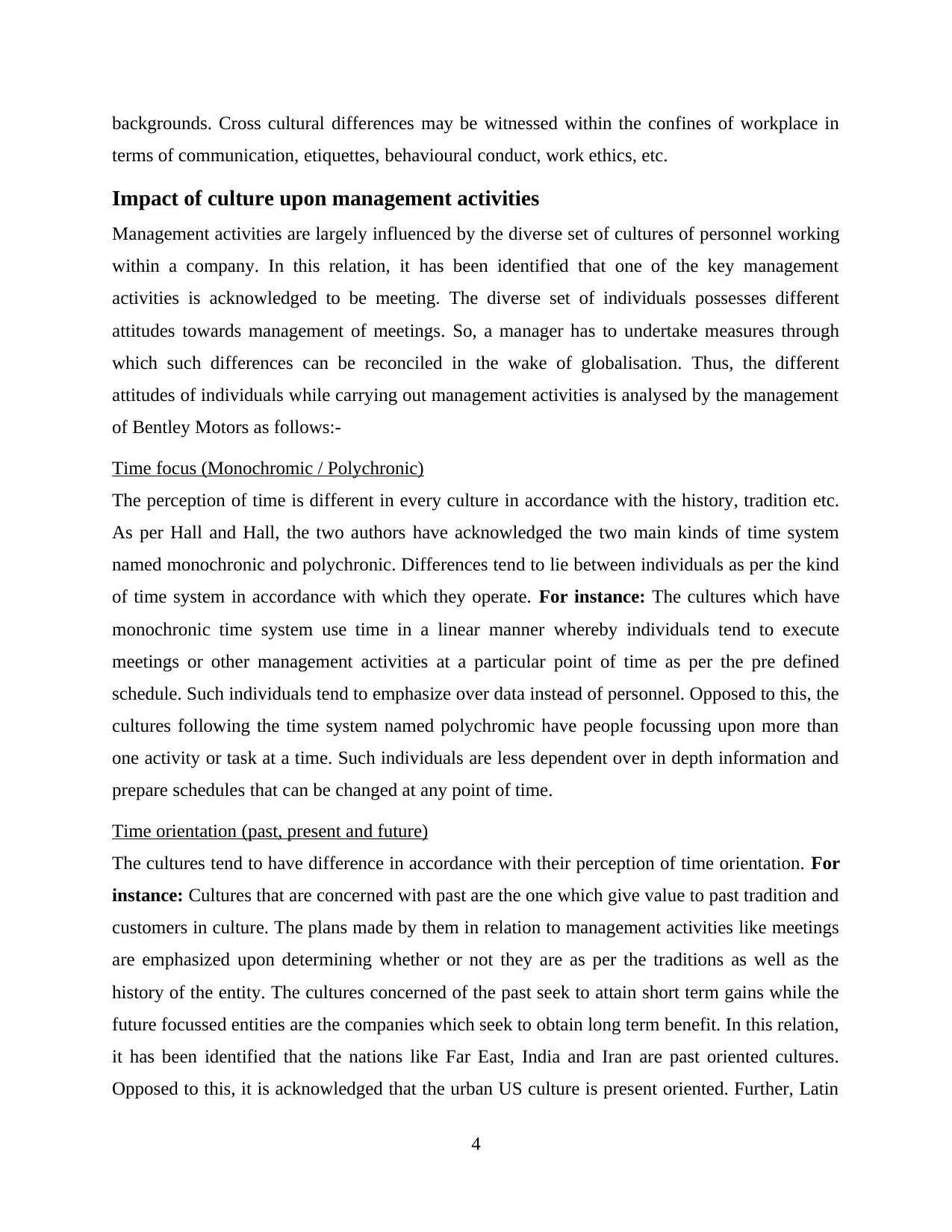
backgrounds. Cross cultural differences may be witnessed within the confines of workplace in
terms of communication, etiquettes, behavioural conduct, work ethics, etc.
Impact of culture upon management activities
Management activities are largely influenced by the diverse set of cultures of personnel working
within a company. In this relation, it has been identified that one of the key management
activities is acknowledged to be meeting. The diverse set of individuals possesses different
attitudes towards management of meetings. So, a manager has to undertake measures through
which such differences can be reconciled in the wake of globalisation. Thus, the different
attitudes of individuals while carrying out management activities is analysed by the management
of Bentley Motors as follows:-
Time focus (Monochromic / Polychronic)
The perception of time is different in every culture in accordance with the history, tradition etc.
As per Hall and Hall, the two authors have acknowledged the two main kinds of time system
named monochronic and polychronic. Differences tend to lie between individuals as per the kind
of time system in accordance with which they operate. For instance: The cultures which have
monochronic time system use time in a linear manner whereby individuals tend to execute
meetings or other management activities at a particular point of time as per the pre defined
schedule. Such individuals tend to emphasize over data instead of personnel. Opposed to this, the
cultures following the time system named polychromic have people focussing upon more than
one activity or task at a time. Such individuals are less dependent over in depth information and
prepare schedules that can be changed at any point of time.
Time orientation (past, present and future)
The cultures tend to have difference in accordance with their perception of time orientation. For
instance: Cultures that are concerned with past are the one which give value to past tradition and
customers in culture. The plans made by them in relation to management activities like meetings
are emphasized upon determining whether or not they are as per the traditions as well as the
history of the entity. The cultures concerned of the past seek to attain short term gains while the
future focussed entities are the companies which seek to obtain long term benefit. In this relation,
it has been identified that the nations like Far East, India and Iran are past oriented cultures.
Opposed to this, it is acknowledged that the urban US culture is present oriented. Further, Latin
4
terms of communication, etiquettes, behavioural conduct, work ethics, etc.
Impact of culture upon management activities
Management activities are largely influenced by the diverse set of cultures of personnel working
within a company. In this relation, it has been identified that one of the key management
activities is acknowledged to be meeting. The diverse set of individuals possesses different
attitudes towards management of meetings. So, a manager has to undertake measures through
which such differences can be reconciled in the wake of globalisation. Thus, the different
attitudes of individuals while carrying out management activities is analysed by the management
of Bentley Motors as follows:-
Time focus (Monochromic / Polychronic)
The perception of time is different in every culture in accordance with the history, tradition etc.
As per Hall and Hall, the two authors have acknowledged the two main kinds of time system
named monochronic and polychronic. Differences tend to lie between individuals as per the kind
of time system in accordance with which they operate. For instance: The cultures which have
monochronic time system use time in a linear manner whereby individuals tend to execute
meetings or other management activities at a particular point of time as per the pre defined
schedule. Such individuals tend to emphasize over data instead of personnel. Opposed to this, the
cultures following the time system named polychromic have people focussing upon more than
one activity or task at a time. Such individuals are less dependent over in depth information and
prepare schedules that can be changed at any point of time.
Time orientation (past, present and future)
The cultures tend to have difference in accordance with their perception of time orientation. For
instance: Cultures that are concerned with past are the one which give value to past tradition and
customers in culture. The plans made by them in relation to management activities like meetings
are emphasized upon determining whether or not they are as per the traditions as well as the
history of the entity. The cultures concerned of the past seek to attain short term gains while the
future focussed entities are the companies which seek to obtain long term benefit. In this relation,
it has been identified that the nations like Far East, India and Iran are past oriented cultures.
Opposed to this, it is acknowledged that the urban US culture is present oriented. Further, Latin
4
⊘ This is a preview!⊘
Do you want full access?
Subscribe today to unlock all pages.

Trusted by 1+ million students worldwide
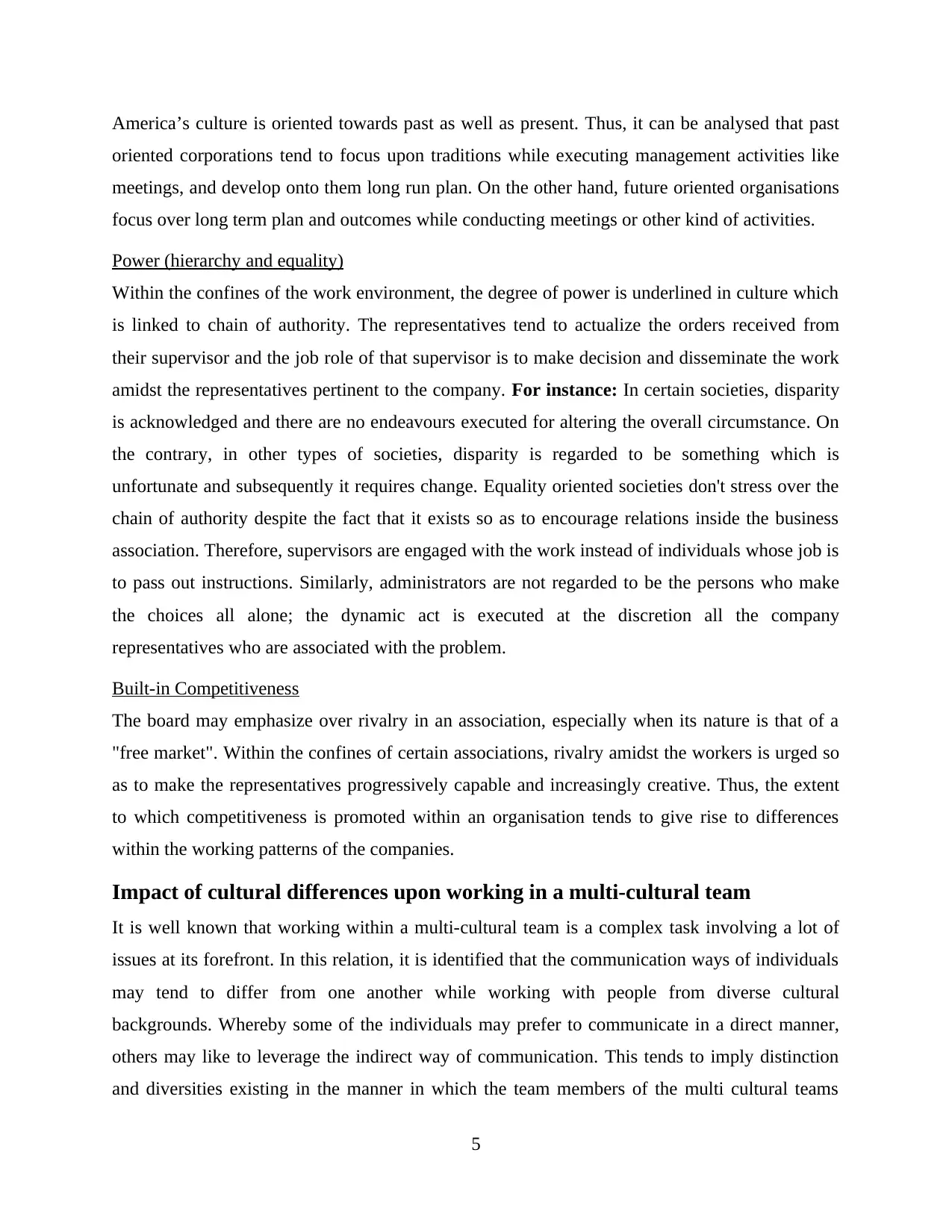
America’s culture is oriented towards past as well as present. Thus, it can be analysed that past
oriented corporations tend to focus upon traditions while executing management activities like
meetings, and develop onto them long run plan. On the other hand, future oriented organisations
focus over long term plan and outcomes while conducting meetings or other kind of activities.
Power (hierarchy and equality)
Within the confines of the work environment, the degree of power is underlined in culture which
is linked to chain of authority. The representatives tend to actualize the orders received from
their supervisor and the job role of that supervisor is to make decision and disseminate the work
amidst the representatives pertinent to the company. For instance: In certain societies, disparity
is acknowledged and there are no endeavours executed for altering the overall circumstance. On
the contrary, in other types of societies, disparity is regarded to be something which is
unfortunate and subsequently it requires change. Equality oriented societies don't stress over the
chain of authority despite the fact that it exists so as to encourage relations inside the business
association. Therefore, supervisors are engaged with the work instead of individuals whose job is
to pass out instructions. Similarly, administrators are not regarded to be the persons who make
the choices all alone; the dynamic act is executed at the discretion all the company
representatives who are associated with the problem.
Built-in Competitiveness
The board may emphasize over rivalry in an association, especially when its nature is that of a
"free market". Within the confines of certain associations, rivalry amidst the workers is urged so
as to make the representatives progressively capable and increasingly creative. Thus, the extent
to which competitiveness is promoted within an organisation tends to give rise to differences
within the working patterns of the companies.
Impact of cultural differences upon working in a multi-cultural team
It is well known that working within a multi-cultural team is a complex task involving a lot of
issues at its forefront. In this relation, it is identified that the communication ways of individuals
may tend to differ from one another while working with people from diverse cultural
backgrounds. Whereby some of the individuals may prefer to communicate in a direct manner,
others may like to leverage the indirect way of communication. This tends to imply distinction
and diversities existing in the manner in which the team members of the multi cultural teams
5
oriented corporations tend to focus upon traditions while executing management activities like
meetings, and develop onto them long run plan. On the other hand, future oriented organisations
focus over long term plan and outcomes while conducting meetings or other kind of activities.
Power (hierarchy and equality)
Within the confines of the work environment, the degree of power is underlined in culture which
is linked to chain of authority. The representatives tend to actualize the orders received from
their supervisor and the job role of that supervisor is to make decision and disseminate the work
amidst the representatives pertinent to the company. For instance: In certain societies, disparity
is acknowledged and there are no endeavours executed for altering the overall circumstance. On
the contrary, in other types of societies, disparity is regarded to be something which is
unfortunate and subsequently it requires change. Equality oriented societies don't stress over the
chain of authority despite the fact that it exists so as to encourage relations inside the business
association. Therefore, supervisors are engaged with the work instead of individuals whose job is
to pass out instructions. Similarly, administrators are not regarded to be the persons who make
the choices all alone; the dynamic act is executed at the discretion all the company
representatives who are associated with the problem.
Built-in Competitiveness
The board may emphasize over rivalry in an association, especially when its nature is that of a
"free market". Within the confines of certain associations, rivalry amidst the workers is urged so
as to make the representatives progressively capable and increasingly creative. Thus, the extent
to which competitiveness is promoted within an organisation tends to give rise to differences
within the working patterns of the companies.
Impact of cultural differences upon working in a multi-cultural team
It is well known that working within a multi-cultural team is a complex task involving a lot of
issues at its forefront. In this relation, it is identified that the communication ways of individuals
may tend to differ from one another while working with people from diverse cultural
backgrounds. Whereby some of the individuals may prefer to communicate in a direct manner,
others may like to leverage the indirect way of communication. This tends to imply distinction
and diversities existing in the manner in which the team members of the multi cultural teams
5
Paraphrase This Document
Need a fresh take? Get an instant paraphrase of this document with our AI Paraphraser
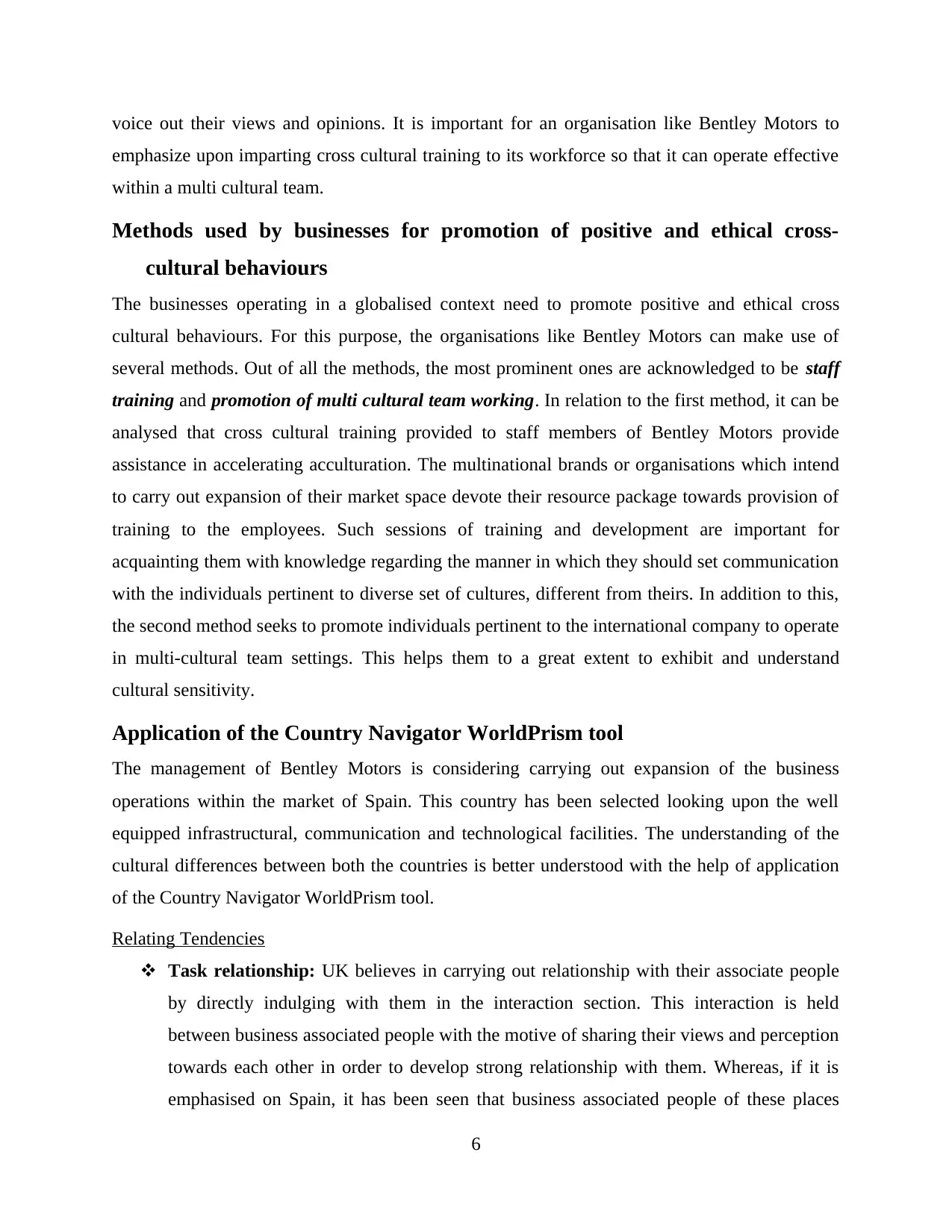
voice out their views and opinions. It is important for an organisation like Bentley Motors to
emphasize upon imparting cross cultural training to its workforce so that it can operate effective
within a multi cultural team.
Methods used by businesses for promotion of positive and ethical cross-
cultural behaviours
The businesses operating in a globalised context need to promote positive and ethical cross
cultural behaviours. For this purpose, the organisations like Bentley Motors can make use of
several methods. Out of all the methods, the most prominent ones are acknowledged to be staff
training and promotion of multi cultural team working. In relation to the first method, it can be
analysed that cross cultural training provided to staff members of Bentley Motors provide
assistance in accelerating acculturation. The multinational brands or organisations which intend
to carry out expansion of their market space devote their resource package towards provision of
training to the employees. Such sessions of training and development are important for
acquainting them with knowledge regarding the manner in which they should set communication
with the individuals pertinent to diverse set of cultures, different from theirs. In addition to this,
the second method seeks to promote individuals pertinent to the international company to operate
in multi-cultural team settings. This helps them to a great extent to exhibit and understand
cultural sensitivity.
Application of the Country Navigator WorldPrism tool
The management of Bentley Motors is considering carrying out expansion of the business
operations within the market of Spain. This country has been selected looking upon the well
equipped infrastructural, communication and technological facilities. The understanding of the
cultural differences between both the countries is better understood with the help of application
of the Country Navigator WorldPrism tool.
Relating Tendencies
Task relationship: UK believes in carrying out relationship with their associate people
by directly indulging with them in the interaction section. This interaction is held
between business associated people with the motive of sharing their views and perception
towards each other in order to develop strong relationship with them. Whereas, if it is
emphasised on Spain, it has been seen that business associated people of these places
6
emphasize upon imparting cross cultural training to its workforce so that it can operate effective
within a multi cultural team.
Methods used by businesses for promotion of positive and ethical cross-
cultural behaviours
The businesses operating in a globalised context need to promote positive and ethical cross
cultural behaviours. For this purpose, the organisations like Bentley Motors can make use of
several methods. Out of all the methods, the most prominent ones are acknowledged to be staff
training and promotion of multi cultural team working. In relation to the first method, it can be
analysed that cross cultural training provided to staff members of Bentley Motors provide
assistance in accelerating acculturation. The multinational brands or organisations which intend
to carry out expansion of their market space devote their resource package towards provision of
training to the employees. Such sessions of training and development are important for
acquainting them with knowledge regarding the manner in which they should set communication
with the individuals pertinent to diverse set of cultures, different from theirs. In addition to this,
the second method seeks to promote individuals pertinent to the international company to operate
in multi-cultural team settings. This helps them to a great extent to exhibit and understand
cultural sensitivity.
Application of the Country Navigator WorldPrism tool
The management of Bentley Motors is considering carrying out expansion of the business
operations within the market of Spain. This country has been selected looking upon the well
equipped infrastructural, communication and technological facilities. The understanding of the
cultural differences between both the countries is better understood with the help of application
of the Country Navigator WorldPrism tool.
Relating Tendencies
Task relationship: UK believes in carrying out relationship with their associate people
by directly indulging with them in the interaction section. This interaction is held
between business associated people with the motive of sharing their views and perception
towards each other in order to develop strong relationship with them. Whereas, if it is
emphasised on Spain, it has been seen that business associated people of these places
6
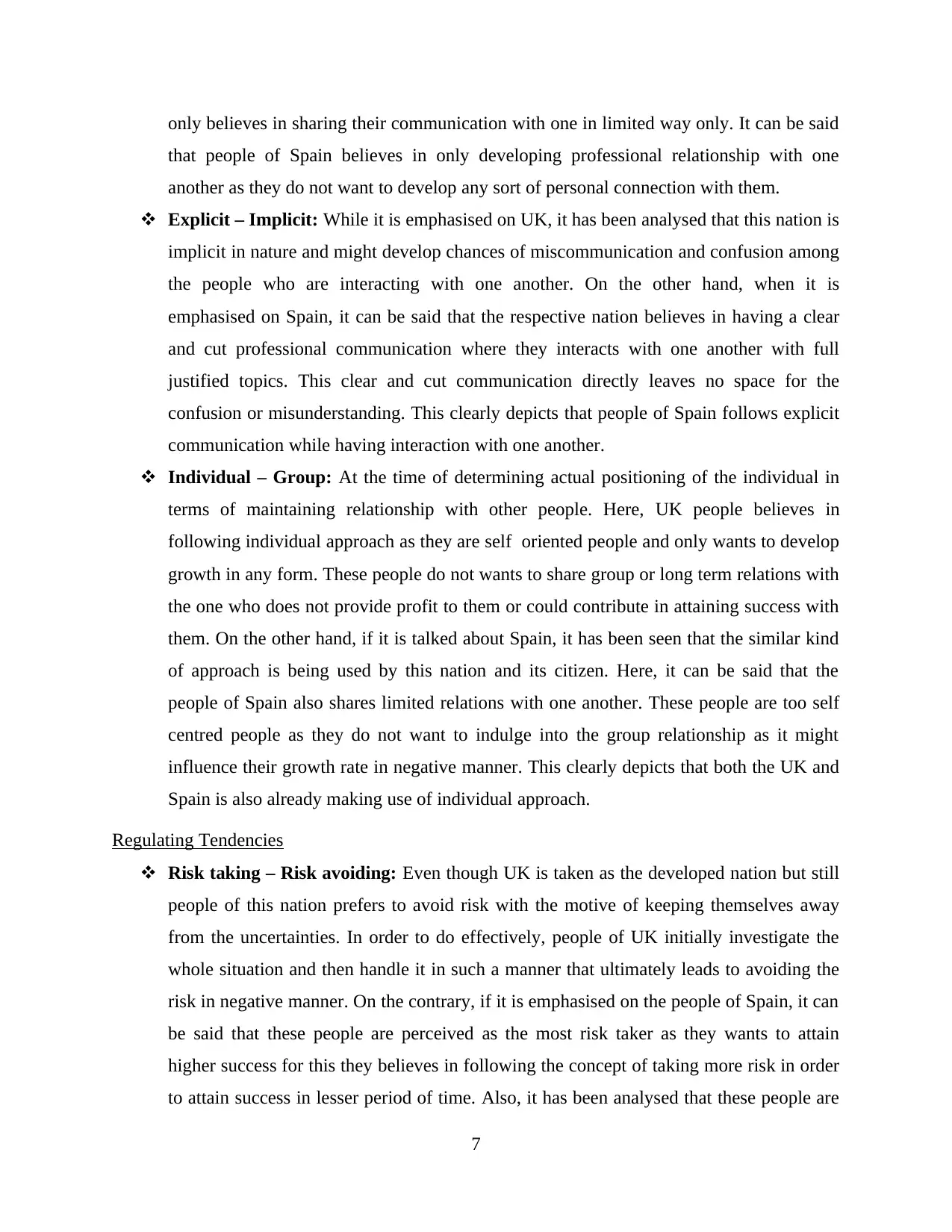
only believes in sharing their communication with one in limited way only. It can be said
that people of Spain believes in only developing professional relationship with one
another as they do not want to develop any sort of personal connection with them.
Explicit – Implicit: While it is emphasised on UK, it has been analysed that this nation is
implicit in nature and might develop chances of miscommunication and confusion among
the people who are interacting with one another. On the other hand, when it is
emphasised on Spain, it can be said that the respective nation believes in having a clear
and cut professional communication where they interacts with one another with full
justified topics. This clear and cut communication directly leaves no space for the
confusion or misunderstanding. This clearly depicts that people of Spain follows explicit
communication while having interaction with one another.
Individual – Group: At the time of determining actual positioning of the individual in
terms of maintaining relationship with other people. Here, UK people believes in
following individual approach as they are self oriented people and only wants to develop
growth in any form. These people do not wants to share group or long term relations with
the one who does not provide profit to them or could contribute in attaining success with
them. On the other hand, if it is talked about Spain, it has been seen that the similar kind
of approach is being used by this nation and its citizen. Here, it can be said that the
people of Spain also shares limited relations with one another. These people are too self
centred people as they do not want to indulge into the group relationship as it might
influence their growth rate in negative manner. This clearly depicts that both the UK and
Spain is also already making use of individual approach.
Regulating Tendencies
Risk taking – Risk avoiding: Even though UK is taken as the developed nation but still
people of this nation prefers to avoid risk with the motive of keeping themselves away
from the uncertainties. In order to do effectively, people of UK initially investigate the
whole situation and then handle it in such a manner that ultimately leads to avoiding the
risk in negative manner. On the contrary, if it is emphasised on the people of Spain, it can
be said that these people are perceived as the most risk taker as they wants to attain
higher success for this they believes in following the concept of taking more risk in order
to attain success in lesser period of time. Also, it has been analysed that these people are
7
that people of Spain believes in only developing professional relationship with one
another as they do not want to develop any sort of personal connection with them.
Explicit – Implicit: While it is emphasised on UK, it has been analysed that this nation is
implicit in nature and might develop chances of miscommunication and confusion among
the people who are interacting with one another. On the other hand, when it is
emphasised on Spain, it can be said that the respective nation believes in having a clear
and cut professional communication where they interacts with one another with full
justified topics. This clear and cut communication directly leaves no space for the
confusion or misunderstanding. This clearly depicts that people of Spain follows explicit
communication while having interaction with one another.
Individual – Group: At the time of determining actual positioning of the individual in
terms of maintaining relationship with other people. Here, UK people believes in
following individual approach as they are self oriented people and only wants to develop
growth in any form. These people do not wants to share group or long term relations with
the one who does not provide profit to them or could contribute in attaining success with
them. On the other hand, if it is talked about Spain, it has been seen that the similar kind
of approach is being used by this nation and its citizen. Here, it can be said that the
people of Spain also shares limited relations with one another. These people are too self
centred people as they do not want to indulge into the group relationship as it might
influence their growth rate in negative manner. This clearly depicts that both the UK and
Spain is also already making use of individual approach.
Regulating Tendencies
Risk taking – Risk avoiding: Even though UK is taken as the developed nation but still
people of this nation prefers to avoid risk with the motive of keeping themselves away
from the uncertainties. In order to do effectively, people of UK initially investigate the
whole situation and then handle it in such a manner that ultimately leads to avoiding the
risk in negative manner. On the contrary, if it is emphasised on the people of Spain, it can
be said that these people are perceived as the most risk taker as they wants to attain
higher success for this they believes in following the concept of taking more risk in order
to attain success in lesser period of time. Also, it has been analysed that these people are
7
⊘ This is a preview!⊘
Do you want full access?
Subscribe today to unlock all pages.

Trusted by 1+ million students worldwide
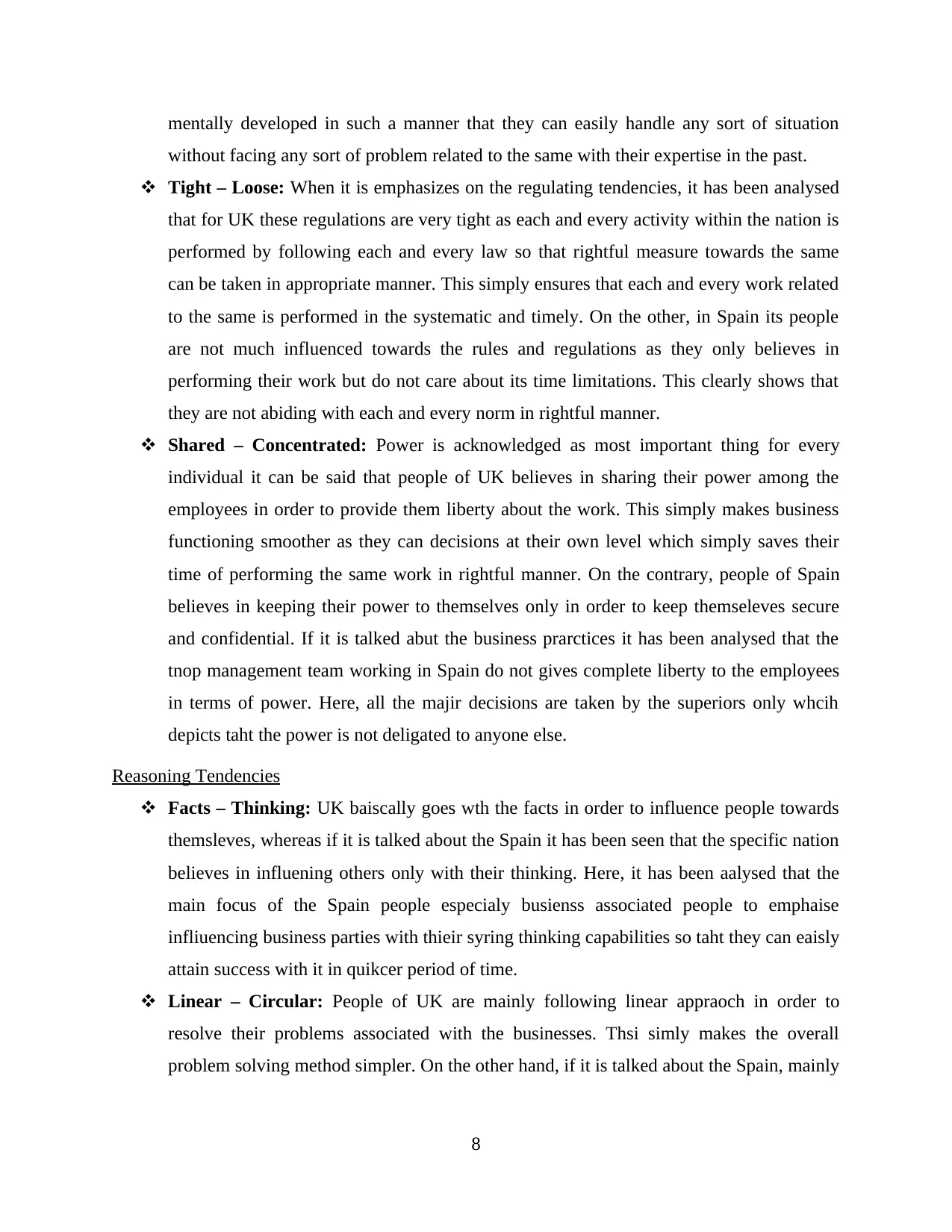
mentally developed in such a manner that they can easily handle any sort of situation
without facing any sort of problem related to the same with their expertise in the past.
Tight – Loose: When it is emphasizes on the regulating tendencies, it has been analysed
that for UK these regulations are very tight as each and every activity within the nation is
performed by following each and every law so that rightful measure towards the same
can be taken in appropriate manner. This simply ensures that each and every work related
to the same is performed in the systematic and timely. On the other, in Spain its people
are not much influenced towards the rules and regulations as they only believes in
performing their work but do not care about its time limitations. This clearly shows that
they are not abiding with each and every norm in rightful manner.
Shared – Concentrated: Power is acknowledged as most important thing for every
individual it can be said that people of UK believes in sharing their power among the
employees in order to provide them liberty about the work. This simply makes business
functioning smoother as they can decisions at their own level which simply saves their
time of performing the same work in rightful manner. On the contrary, people of Spain
believes in keeping their power to themselves only in order to keep themseleves secure
and confidential. If it is talked abut the business prarctices it has been analysed that the
tnop management team working in Spain do not gives complete liberty to the employees
in terms of power. Here, all the majir decisions are taken by the superiors only whcih
depicts taht the power is not deligated to anyone else.
Reasoning Tendencies
Facts – Thinking: UK baiscally goes wth the facts in order to influence people towards
themsleves, whereas if it is talked about the Spain it has been seen that the specific nation
believes in influening others only with their thinking. Here, it has been aalysed that the
main focus of the Spain people especialy busienss associated people to emphaise
infliuencing business parties with thieir syring thinking capabilities so taht they can eaisly
attain success with it in quikcer period of time.
Linear – Circular: People of UK are mainly following linear appraoch in order to
resolve their problems associated with the businesses. Thsi simly makes the overall
problem solving method simpler. On the other hand, if it is talked about the Spain, mainly
8
without facing any sort of problem related to the same with their expertise in the past.
Tight – Loose: When it is emphasizes on the regulating tendencies, it has been analysed
that for UK these regulations are very tight as each and every activity within the nation is
performed by following each and every law so that rightful measure towards the same
can be taken in appropriate manner. This simply ensures that each and every work related
to the same is performed in the systematic and timely. On the other, in Spain its people
are not much influenced towards the rules and regulations as they only believes in
performing their work but do not care about its time limitations. This clearly shows that
they are not abiding with each and every norm in rightful manner.
Shared – Concentrated: Power is acknowledged as most important thing for every
individual it can be said that people of UK believes in sharing their power among the
employees in order to provide them liberty about the work. This simply makes business
functioning smoother as they can decisions at their own level which simply saves their
time of performing the same work in rightful manner. On the contrary, people of Spain
believes in keeping their power to themselves only in order to keep themseleves secure
and confidential. If it is talked abut the business prarctices it has been analysed that the
tnop management team working in Spain do not gives complete liberty to the employees
in terms of power. Here, all the majir decisions are taken by the superiors only whcih
depicts taht the power is not deligated to anyone else.
Reasoning Tendencies
Facts – Thinking: UK baiscally goes wth the facts in order to influence people towards
themsleves, whereas if it is talked about the Spain it has been seen that the specific nation
believes in influening others only with their thinking. Here, it has been aalysed that the
main focus of the Spain people especialy busienss associated people to emphaise
infliuencing business parties with thieir syring thinking capabilities so taht they can eaisly
attain success with it in quikcer period of time.
Linear – Circular: People of UK are mainly following linear appraoch in order to
resolve their problems associated with the businesses. Thsi simly makes the overall
problem solving method simpler. On the other hand, if it is talked about the Spain, mainly
8
Paraphrase This Document
Need a fresh take? Get an instant paraphrase of this document with our AI Paraphraser
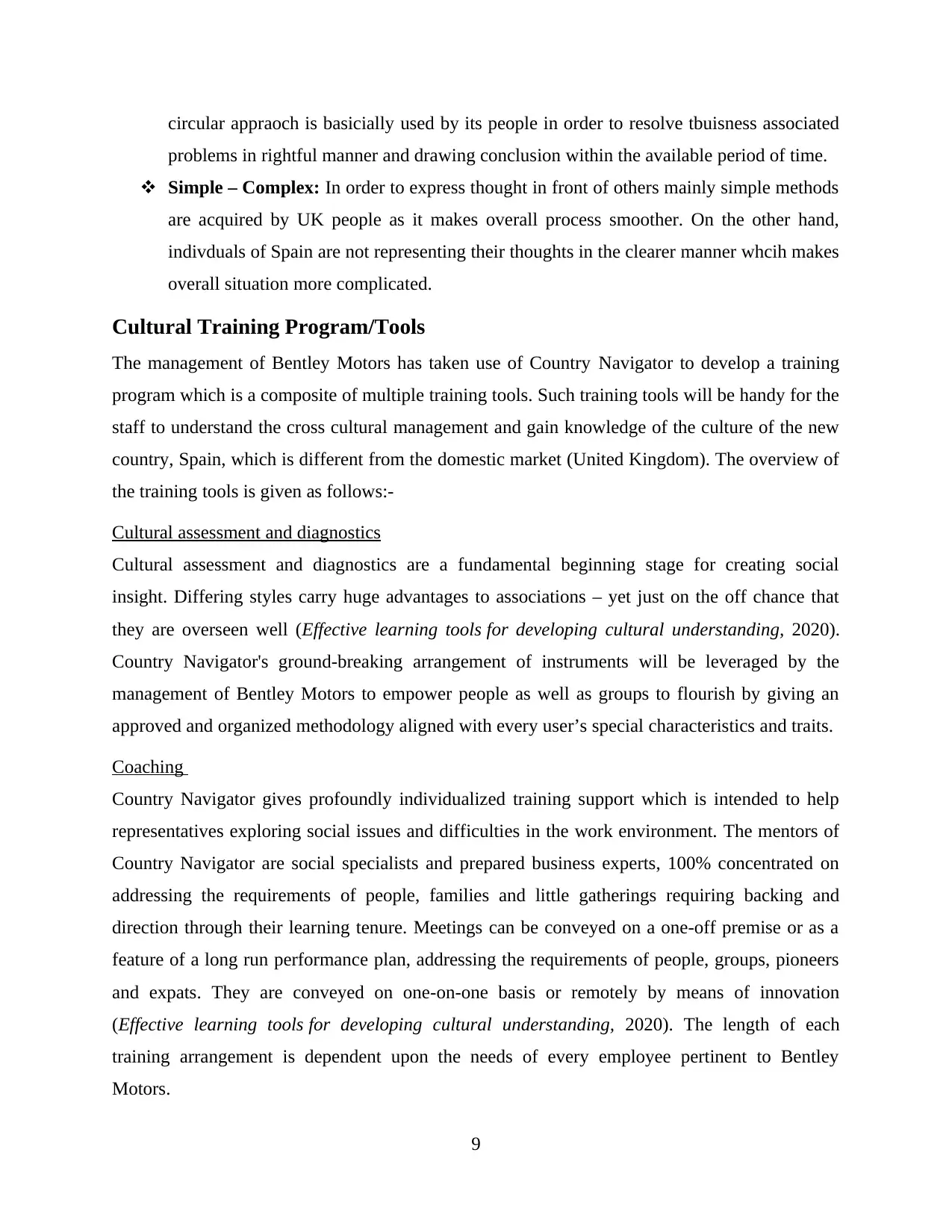
circular appraoch is basicially used by its people in order to resolve tbuisness associated
problems in rightful manner and drawing conclusion within the available period of time.
Simple – Complex: In order to express thought in front of others mainly simple methods
are acquired by UK people as it makes overall process smoother. On the other hand,
indivduals of Spain are not representing their thoughts in the clearer manner whcih makes
overall situation more complicated.
Cultural Training Program/Tools
The management of Bentley Motors has taken use of Country Navigator to develop a training
program which is a composite of multiple training tools. Such training tools will be handy for the
staff to understand the cross cultural management and gain knowledge of the culture of the new
country, Spain, which is different from the domestic market (United Kingdom). The overview of
the training tools is given as follows:-
Cultural assessment and diagnostics
Cultural assessment and diagnostics are a fundamental beginning stage for creating social
insight. Differing styles carry huge advantages to associations – yet just on the off chance that
they are overseen well (Effective learning tools for developing cultural understanding, 2020).
Country Navigator's ground-breaking arrangement of instruments will be leveraged by the
management of Bentley Motors to empower people as well as groups to flourish by giving an
approved and organized methodology aligned with every user’s special characteristics and traits.
Coaching
Country Navigator gives profoundly individualized training support which is intended to help
representatives exploring social issues and difficulties in the work environment. The mentors of
Country Navigator are social specialists and prepared business experts, 100% concentrated on
addressing the requirements of people, families and little gatherings requiring backing and
direction through their learning tenure. Meetings can be conveyed on a one-off premise or as a
feature of a long run performance plan, addressing the requirements of people, groups, pioneers
and expats. They are conveyed on one-on-one basis or remotely by means of innovation
(Effective learning tools for developing cultural understanding, 2020). The length of each
training arrangement is dependent upon the needs of every employee pertinent to Bentley
Motors.
9
problems in rightful manner and drawing conclusion within the available period of time.
Simple – Complex: In order to express thought in front of others mainly simple methods
are acquired by UK people as it makes overall process smoother. On the other hand,
indivduals of Spain are not representing their thoughts in the clearer manner whcih makes
overall situation more complicated.
Cultural Training Program/Tools
The management of Bentley Motors has taken use of Country Navigator to develop a training
program which is a composite of multiple training tools. Such training tools will be handy for the
staff to understand the cross cultural management and gain knowledge of the culture of the new
country, Spain, which is different from the domestic market (United Kingdom). The overview of
the training tools is given as follows:-
Cultural assessment and diagnostics
Cultural assessment and diagnostics are a fundamental beginning stage for creating social
insight. Differing styles carry huge advantages to associations – yet just on the off chance that
they are overseen well (Effective learning tools for developing cultural understanding, 2020).
Country Navigator's ground-breaking arrangement of instruments will be leveraged by the
management of Bentley Motors to empower people as well as groups to flourish by giving an
approved and organized methodology aligned with every user’s special characteristics and traits.
Coaching
Country Navigator gives profoundly individualized training support which is intended to help
representatives exploring social issues and difficulties in the work environment. The mentors of
Country Navigator are social specialists and prepared business experts, 100% concentrated on
addressing the requirements of people, families and little gatherings requiring backing and
direction through their learning tenure. Meetings can be conveyed on a one-off premise or as a
feature of a long run performance plan, addressing the requirements of people, groups, pioneers
and expats. They are conveyed on one-on-one basis or remotely by means of innovation
(Effective learning tools for developing cultural understanding, 2020). The length of each
training arrangement is dependent upon the needs of every employee pertinent to Bentley
Motors.
9
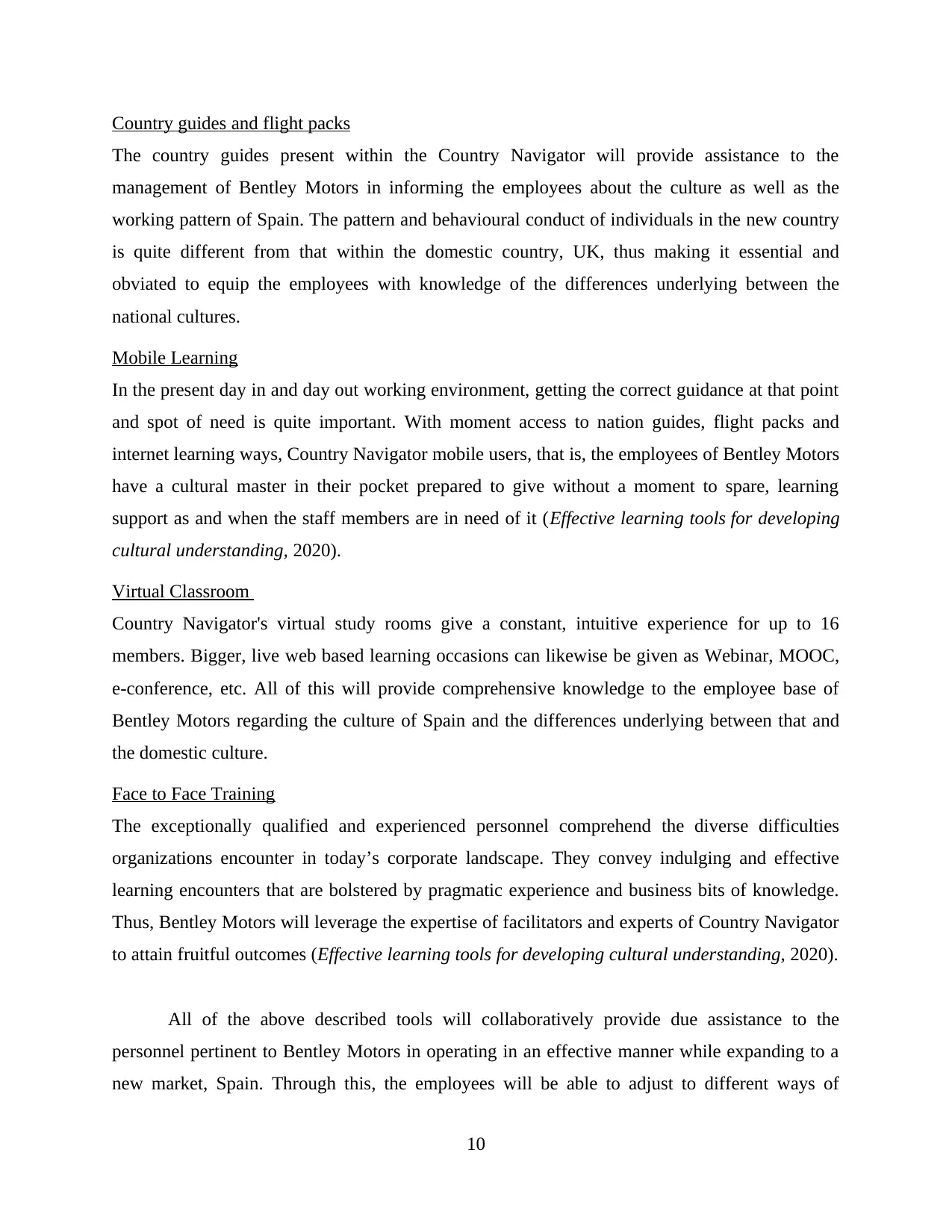
Country guides and flight packs
The country guides present within the Country Navigator will provide assistance to the
management of Bentley Motors in informing the employees about the culture as well as the
working pattern of Spain. The pattern and behavioural conduct of individuals in the new country
is quite different from that within the domestic country, UK, thus making it essential and
obviated to equip the employees with knowledge of the differences underlying between the
national cultures.
Mobile Learning
In the present day in and day out working environment, getting the correct guidance at that point
and spot of need is quite important. With moment access to nation guides, flight packs and
internet learning ways, Country Navigator mobile users, that is, the employees of Bentley Motors
have a cultural master in their pocket prepared to give without a moment to spare, learning
support as and when the staff members are in need of it (Effective learning tools for developing
cultural understanding, 2020).
Virtual Classroom
Country Navigator's virtual study rooms give a constant, intuitive experience for up to 16
members. Bigger, live web based learning occasions can likewise be given as Webinar, MOOC,
e-conference, etc. All of this will provide comprehensive knowledge to the employee base of
Bentley Motors regarding the culture of Spain and the differences underlying between that and
the domestic culture.
Face to Face Training
The exceptionally qualified and experienced personnel comprehend the diverse difficulties
organizations encounter in today’s corporate landscape. They convey indulging and effective
learning encounters that are bolstered by pragmatic experience and business bits of knowledge.
Thus, Bentley Motors will leverage the expertise of facilitators and experts of Country Navigator
to attain fruitful outcomes (Effective learning tools for developing cultural understanding, 2020).
All of the above described tools will collaboratively provide due assistance to the
personnel pertinent to Bentley Motors in operating in an effective manner while expanding to a
new market, Spain. Through this, the employees will be able to adjust to different ways of
10
The country guides present within the Country Navigator will provide assistance to the
management of Bentley Motors in informing the employees about the culture as well as the
working pattern of Spain. The pattern and behavioural conduct of individuals in the new country
is quite different from that within the domestic country, UK, thus making it essential and
obviated to equip the employees with knowledge of the differences underlying between the
national cultures.
Mobile Learning
In the present day in and day out working environment, getting the correct guidance at that point
and spot of need is quite important. With moment access to nation guides, flight packs and
internet learning ways, Country Navigator mobile users, that is, the employees of Bentley Motors
have a cultural master in their pocket prepared to give without a moment to spare, learning
support as and when the staff members are in need of it (Effective learning tools for developing
cultural understanding, 2020).
Virtual Classroom
Country Navigator's virtual study rooms give a constant, intuitive experience for up to 16
members. Bigger, live web based learning occasions can likewise be given as Webinar, MOOC,
e-conference, etc. All of this will provide comprehensive knowledge to the employee base of
Bentley Motors regarding the culture of Spain and the differences underlying between that and
the domestic culture.
Face to Face Training
The exceptionally qualified and experienced personnel comprehend the diverse difficulties
organizations encounter in today’s corporate landscape. They convey indulging and effective
learning encounters that are bolstered by pragmatic experience and business bits of knowledge.
Thus, Bentley Motors will leverage the expertise of facilitators and experts of Country Navigator
to attain fruitful outcomes (Effective learning tools for developing cultural understanding, 2020).
All of the above described tools will collaboratively provide due assistance to the
personnel pertinent to Bentley Motors in operating in an effective manner while expanding to a
new market, Spain. Through this, the employees will be able to adjust to different ways of
10
⊘ This is a preview!⊘
Do you want full access?
Subscribe today to unlock all pages.

Trusted by 1+ million students worldwide
1 out of 14
Related Documents
Your All-in-One AI-Powered Toolkit for Academic Success.
+13062052269
info@desklib.com
Available 24*7 on WhatsApp / Email
![[object Object]](/_next/static/media/star-bottom.7253800d.svg)
Unlock your academic potential
Copyright © 2020–2026 A2Z Services. All Rights Reserved. Developed and managed by ZUCOL.





